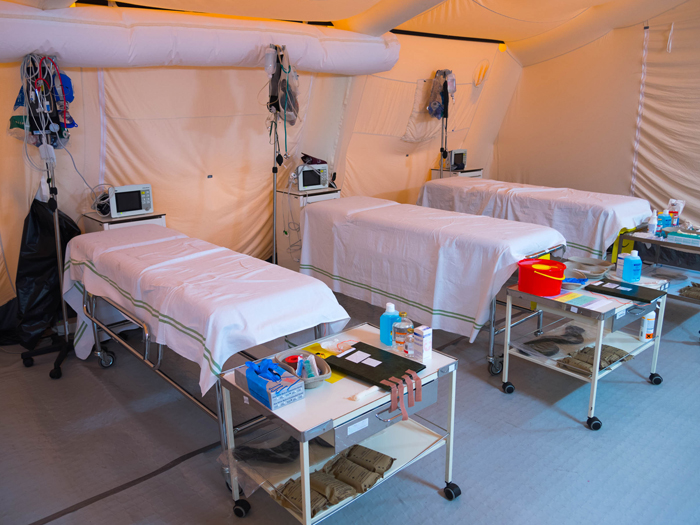When Hotels Become Hospitals: A New Set of COVID-19 Risks

Late winter at the Liacouras Center in Philadelphia typically means huge crowds for college basketball. Spring brings concerts, wrestling and other attractions.
This year, 200 hospital beds line the expansive arena floor, transforming the 10,000-seat venue into a makeshift health care facility.
Welcome to the new normal in hospitality.
Facilities of all types are being repurposed to help health care facilities overwhelmed by coronavirus.
Hotels, arenas and convention centers that would otherwise be sitting dormant are turning into hospitals, quarantine centers or dormitories for health care workers.
A once bustling hotel in Columbus, Ohio has been transformed into a shelter for homeless coronavirus patients. The City of Austin leased a 292-room hotel for quarantine and isolation purposes.
There are similar examples across the country.
The new arrangements make sense for all parties. Operators of hotels and arenas can earn revenue while doing community service. Cities, municipalities and health care organizations get access to large spaces to handle patient overflow.
The Risk of Repurposing
But repurposing those facilities comes with serious risks and lots of questions. What if hospitality workers get sick while a venue is being used for another purpose? Can you reasonably expect janitorial staff to clean up medical waste? Is insurance coverage still valid?
Making the decision to repurpose a facility should depend on the level of insurance protection you’re getting from the third-party group, said Sean Murphy, senior director and vice president of the hospitality practice at Arthur J. Gallagher.
“It’s an easier decision, though still not without risk to the hotelier, if the third-party has good insurance, takes full indemnity, leases the facility from the owner, and agrees to make sure it’s cleaned and disinfected afterwards,” Murphy said. “But these are still unchartered waters and should be evaluated on a case-by-case basis with counsel.”
When life returns to normal, will customers be reluctant to visit a hotel or arena used to house patients? Even if medical professionals and hospitality facility operators take every precaution to mitigate future risks, it might not be enough to quell public perception.
It’s All About Perception
Gigi Norris, co-leader of the Pandemic Task Force at Aon, argues that businesses should accentuate the positives — namely doing valuable community service during a time of great need. They should also show how they cleaned and disinfected the facility before returning to normal operations.
Perhaps a coordinated social media and marketing effort can help ease the worries of potential customers.
“It’s about managing the message. You’ve got to tell your story. You must explain that you used your asset to support the community in a time of crisis and that this activity fits into your Environment, Sustainability and Governance (ESG) framework,” Norris said.
Keeping Your Workers Safe
Another big factor is employee safety. If a front desk worker or bellhop at a hotel is suddenly working in a make-shift coronavirus hospital, how can their safety be assured?
“Communicate plainly and clearly that you’re going to do everything you can to protect them and that you’re leaving healthcare work to the healthcare workers,” Norris said. “Make sure they know they’re just responsible for the traditional work done in hospitality.”
Another risk is coverage. If you are changing the primary use of the facility, does insurance coverage like general liability or workers’ comp become null and void?
Greg Scheinman, shareholder at Insgroup Inc. said to be upfront with carriers to help understand if coverages change.
“I don’t know if there’s a definitive answer there,” Scheinman said. “I would recommend having a conversation with agents and insurance carriers about a fundamental change in their risk profiles to find out if they are or are not covered.”
Doing this correctly takes process mapping — a deep understanding of the tasks workers do day after day and how they change when a facility is repurposed. Perhaps cleaning, laundry and security responsibilities fall to the occupier not the housekeepers, while food preparation stays in-house.
“I would imagine the manner you would clean an arena after an event is different from the manner in which you would clean a hospital room,” said Scheinman. “And I imagine the training and what those individuals are exposed to during the course of their jobs is very different.”
In any event, it’s a great time to review your contingency plans, said Norris.
“Use this time as a general business continuity exercise. Think about how a loss of human capital can affect what you do as opposed to a loss of a building.” &










